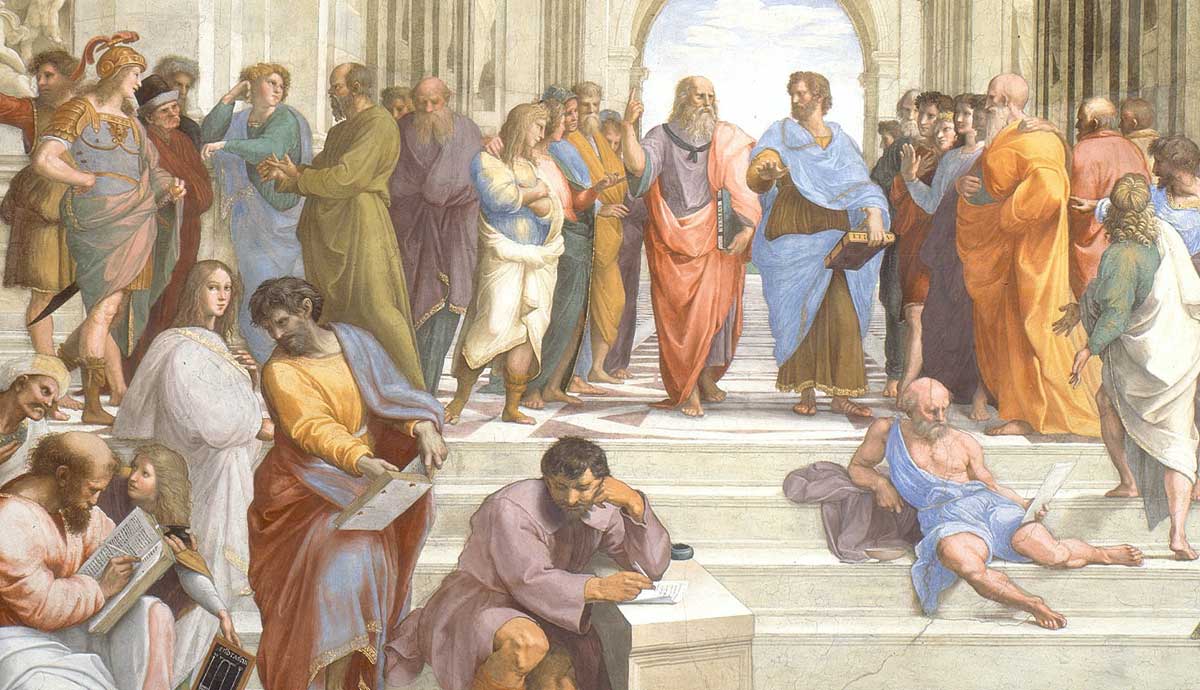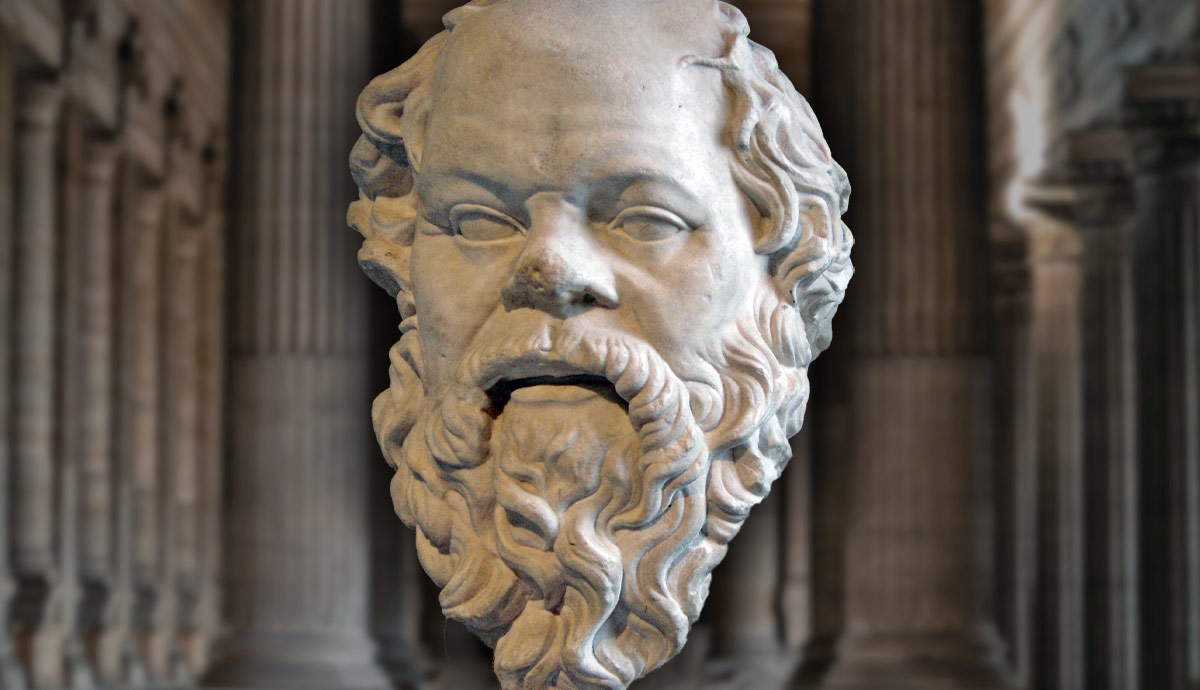
Mankind has always asked questions about the world, existence, life and death. However, it was in Ancient Greece that the systematic and rational approach to knowledge known as philosophy was born. What was, up until that point in history, mixed with myths and superstitions, now leaned towards reasoning, dialogue and natural science. Ancient Greek philosophy has no shortage of brilliant minds, but we will be taking a closer look at five who are among the most influential of all time. These names are instantly recognizable to most people and their thoughts still evoke enticing discussions to this day.
1. Thales of Miletus

In a discussion about the most prominent minds of Ancient Greek philosophy, we must begin with a man who changed the way that Western civilization approaches knowledge. Thales of Miletus was arguably the first philosopher and deemed by many to be the first scientist too. Born around 620-640 BCE, this Ionian freethinker paved the way for philosophy to flourish in Ancient Greece through his speculation on the origin of all things.
A man of great wisdom in areas such as politics and astronomy, Thales sought to find the basic principle of the world: the one element from which everything derives and to which everything returns. Through observations of nature, Thales concluded that this basic principle was water. Water is essential for humans, animals and plants to survive, being the most abundant resource on the planet. Water possesses a cyclical nature, flowing from one place to another, changing its physical state. Thales’ ideas were only reinforced by his trips to Egypt, a country that worshiped the river Nile as a gift from the gods.
Thales’ conclusion is not only understandable, but it is also not far-fetched at all, even by today’s standards. While we now know that water is not a particle from which every other substance derives, modern science has expanded our understanding of its importance. Our bodies mostly consist of water and it is considered the determinant factor for the development of life on Earth. It is amazing that these discoveries were somewhat predicted by an Ancient Greek philosopher.
2. Socrates

The relevance of Socrates and his importance to philosophy are two things that cannot be denied. This man left no writing of his own and yet is the central figure of Ancient Greek philosophy. Born in Athens in 470 BCE, Socrates coexisted with many intellectuals such as natural philosophers, who wanted to identify the basic element of nature, and sophists, who were more interested in the pragmatic side of knowledge.
A man of great morals and ethics, Socrates was responsible for creating the Elenchus, or the socratic method of dialogue, a systematic way to stimulate critical thinking, encourage the exposition of different ideas, and find contradictions in order to avoid false conclusions. Socrates would start the conversation with a very enticing or even controversial opinion, willingly doing so to provoke responses from his peers. From that point onwards, the philosopher would oppose every affirmation with questions to assert if it was a valid opinion or if it could be broken. This method is the basis through which philosophy has developed over the years, and has even inspired our educational and law systems too.
However, this habit of questioning everything and everyone might have been the cause of his death. Socrates was sentenced to death and died in 399 BCE, drinking hemlock and accepting his destiny as a final lesson to his students and the ultimate confirmation of his belief in absolute truth and virtue. It would be through his students, namely Plato, that his legacy would directly continue, but the philosopher most certainly indirectly paved the way for many others to come.
3. Plato

Following the teachings of his master, Plato was the one who continued to propel philosophy forward. He was not only one of the most prominent minds in Ancient Greece but one of the most brilliant humans in all of history. He was not only a student but a sort of scribe for Socrates, writing down most known dialogues of the philosopher.
The two most influential works of Plato are Phaedo, a direct exposition and explanation of the central part of Plato’s philosophy in the theory of forms, and the Republic, in which not only does Plato elaborates on the theory of forms but also explains his political views and proposes the system for an ideal society. The philosophy of Plato is based around the concept of there being ideal primordial forms of everything that we see and experience in this world. According to this concept, excellence lies in chasing the approximation to these inaccessible perfect forms, and virtue comes from the ideal form of good.
Studying Plato is essential for any scholar or enthusiast of philosophy. His work is still widely discussed to this day and his legacy as the first philosopher to approach metaphysics in a systematic manner is absolutely groundbreaking.
4. Aristotle

It is hard to mention Plato without talking about his most brilliant student and the counterpart to his philosophy of transcendence, Aristotle. This Ancient Greek philosopher was one of the most versatile and influential thinkers in history, with extensive work in many fields of knowledge. On top of that, he was the tutor of none other than Alexander the Great and founder of the Lyceum, one of the most famous philosophy schools in history.
As mentioned above, Aristotle presented a counterpart to the philosophy of his teacher Plato, who emphasized transcendence in the theory of Forms, while Aristotle emphasized empirical observation and believed that knowledge arises from experience. That being said, it is clear that while previous philosophers laid the groundwork for the development of science as a whole, it was Aristotle who built the foundations of formal logic and developed systematic approaches to biology, politics, and metaphysics. Furthermore, Aristotle proposed the idea of virtue ethics, arguing that moral virtue lies in finding the “golden mean” between extremes, a central idea that permeated through most of his work.
His insistence on careful observation and logical categorization provided a framework that dominated intellectual inquiry for centuries. Known simply as “The Philosopher” by later scholars, and being responsible for shaping medieval philosophy, Christian and Islamic thought, and even modern science, Aristotle’s work remains foundational, underscoring his enduring impact on how we understand the world and our place within it.
5. Pythagoras

While most of the philosophers we have just mentioned are well known and commonly discussed in philosophy, there is another one whose name most people can recognize: Pythagoras. Born around 570 BCE on the island of Samos, this Ancient Greek philosopher is best remembered for the famous Pythagorean Theorem. However, his influence reaches far beyond mathematics.
A traveler and wisdom-seeker, Pythagoras spent much of his life travelling to places such as Egypt and Babylon. He eventually settled in Croton, where he founded a unique philosophical community. His followers, known as Pythagoreans, lived under strict rules, embracing ideas such as the transmigration of souls and the pursuit of purity through study and ascetic living. Central to Pythagorean thought was the belief that numbers form the true essence of all things, an idea that linked mathematics with the structure of the cosmos. This continued the legacy of the pre-Socratics, such as Thales, in their pursuit of the basic principle of the universe. Pythagoras saw harmony in music, geometry, and astronomy, believing that the universe was a beautifully-ordered system governed by numerical relationships. This idea of a rational, ordered cosmos might sound familiar, and that is because it deeply influenced Plato and, by extension, much of Western thought.
While many legends surround Pythagoras and his mystical, unusual practices, his importance cannot be denied. His work planted the early seeds for fields like mathematical theory, musical harmony, and metaphysics, and his belief in an intelligible universe still resonates in modern science.
The Influence of Ancient Greek Philosophy

In conclusion, the philosophers of Ancient Greece—Thales, Pythagoras, Socrates, Plato, and Aristotle—laid the intellectual foundations that continue to shape modern Western civilization, being among the most prominent minds of human history.
Thales was the first to shift away from mythological explanations of the world, proposing that natural phenomena had rational, scientific explanations, marking the birth of natural philosophy. Socrates revolutionized how we approach discussing different ideas, encouraging critical questioning and self-examination, fostering an enduring tradition of critical thought that is still present today in education and law. Plato, as the student of Socrates, developed the theory of Forms, which explored the nature of reality and idealism, establishing the groundwork for future philosophers in the area of metaphysics. Aristotle systematized knowledge across many disciplines—ethics, politics, logic, biology, and metaphysics—forming the basis of many modern academic fields and the scientific method, and being the primary influence on medieval philosophy. Pythagoras introduced the idea that mathematics governs the cosmos, blending abstract thought with tangible reality, a concept that continues to influence fields like physics, music theory, and even computer science.
Together, these philosophers cultivated an intellectual environment that emphasized reason, observation, and moral inquiry. Their ideas sparked the development of Western philosophy, science, mathematics, and political thought, profoundly influencing figures like Augustine and Thomas Aquinas. The legacy of their work is embedded in our educational systems, scientific principles, ethical debates, and the very structure of modern democratic societies, as previously mentioned, making their contributions as vital today as they were thousands of years ago.










